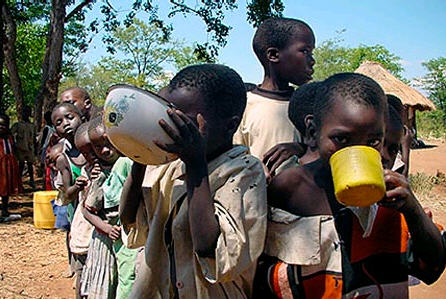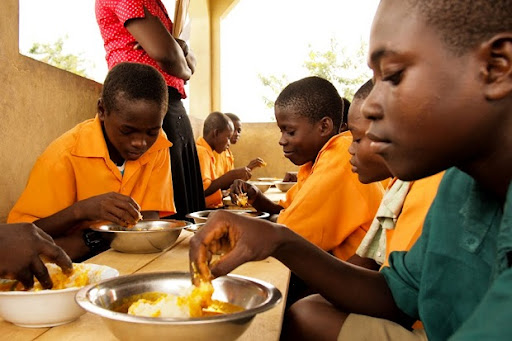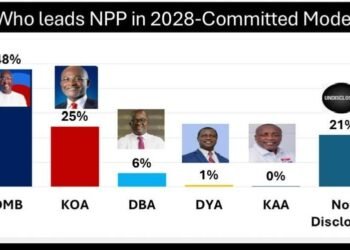Kofi Asare, Executive Director of Africa Education Watch (Eduwatch), has renewed calls for a comprehensive overhaul of the Ghana School Feeding Programme (GSFP) following a visit to Besease M/A Primary School in Ejisu, Ashanti Region.
His firsthand encounter with the substandard meals served to students at the school has reignited concerns over the sustainability and effectiveness of the program.
In his statement, Kofi Asare emphasized the urgent need for increased government funding, decentralization, and depoliticization of GSFP’s management, arguing that the current allocation of GH₵1.5 per meal is woefully inadequate.
His remarks add to the growing discourse on the program’s challenges, with many stakeholders calling for reforms in the upcoming 2025 budget.
Kofi Asare’s visit to Besease M/A Primary School exposed the dire state of school meals being served to students under GSFP. With over 400 pupils in the school relying on the program for their daily sustenance, he questioned the quality and nutritional value of the food given to basic school children under the program.
The situation at Besease M/A Primary School, according to Kofi Asare, is a microcosm of the challenges facing the broader school feeding program, which serves approximately 3.6 million kindergarten and primary school children nationwide.
“The government must increase fund allocation to the Ghana School Feeding Programme (GSFP), decentralize and depoliticize its management to the District Assemblies, while the Ministry of Education and the Ministry of Gender, Children, and Social Protection supervise for standards”.
Kofi Asare, Executive Director for Africa Education Watch (Eduwatch)
His frustrations were summed up in a humorous yet pointed remark: “Without fried plantain, this can only be called ‘Go’ not ‘Gob3’!”—a reference to ‘Gob3’, a popular Ghanaian dish of beans and fried plantain, highlighting the poor quality of the food provided.
The Ghana School Feeding Programme
The Ghana School Feeding Programme (GSFP) is part of the Comprehensive Africa Agricultural Development Programme (CAADP) Pillar 3, which aims to enhance food security and reduce hunger.
The initiative aligns with the United Nations Sustainable Development Goals (SDGs), particularly those addressing hunger, poverty, and malnutrition.
Under GSFP, schoolchildren in public primary schools are supposed to receive one nutritious meal daily, sourced from locally grown foodstuffs.
The program’s key objectives include reducing hunger and malnutrition, increasing school enrollment and retention, and stimulating local agricultural production by ensuring that at least 80% of the feeding cost is spent in the local economy.
Despite its noble intentions, the program has been plagued by chronic underfunding, delays in payments to caterers, political interference, and concerns about the quality of food served.

According to Eduwatch, while approximately 3.8 million pupils benefit from GSFP, its financial sustainability remains a major challenge.
In the 2024 budget, the government allocated GH₵1.39 billion to GSFP—an increase of 43% from the GH₵969 million allocated in the 2023 main budget.
However, when adjusted for food inflation, which stood at 44% in December 2023, the real value of the allocation drops to GH₵779 million.
This amount is even lower than the 2022 nominal allocation of GH₵881 million, signaling a continued decline in the program’s financial strength.
With inflation eroding the real purchasing power of government funding, the GH₵1.5 per meal currently allocated is increasingly insufficient to provide children with nutritious meals.
The result has been smaller food portions, compromised meal quality, and growing dissatisfaction among pupils, parents, and caterers alike.
Kofi Asare’s call for increased funding re-echoed numerous calls by student unions and education-focused civil society organizations, including the Africa Education Watch, that an upward adjustment in per-child meal allocation is necessary to meet the program’s objectives.
Many believe that a realistic allocation should be in the range of GH₵3.5 to GH₵5 per child to account for rising food prices and ensure balanced nutrition.
Additionally, Kofi Asare advocated for decentralizing the management of GSFP to District Assemblies to minimize bureaucratic bottlenecks and political interference.
Currently, the program is administered at the national level, with political considerations often influencing decisions on the selection of caterers and the distribution of resources.
Decentralization would allow local authorities to directly oversee food procurement, ensure better quality control, and streamline payment processes for caterers, many of whom have complained about long delays in receiving their funds.
Kofi Asare’s visit to Besease M/A Primary School has once again brought the challenges of the Ghana School Feeding Programme into the spotlight.

With millions of children depending on this initiative for daily sustenance, its sustainability and effectiveness must be a top priority for the government.
The upcoming 2025 budget presents an opportunity for policymakers to reset GSFP by increasing funding, decentralizing management, and strengthening oversight mechanisms.
Failure to act decisively could compromise the future of the program and, by extension, the health and educational outcomes of Ghana’s next generation.
For now, as Asare aptly put it, without adequate funding and proper management, GSFP risks serving nothing more than a meager meal—certainly not the balanced and nutritious food that children deserve.
READ ALSO: MTN Ghana’s Stock Poised for Q2 Surge After Recording GH¢5.028bn Profit– Analyst























